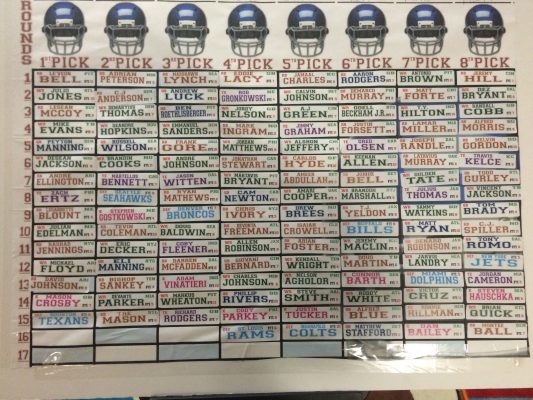The Popularity of Fantasy Sports Continues to Grow
Sports leagues prepare for the season by drafting players onto teams. (ALEXANDER DIMISA/THE OBSERVER)
November 4, 2016
While nearly 75 million people play fantasy football in the United States and Canada this year, according to Forbes, many people do not know very much about industry behind the game. Fantasy sports gives you the opportunity to draft your own team of players, trade them, adjust your roster and create a team fit for a championship. You can have the option to create your own fantasy team in almost every major sport, including hockey, basketball and baseball. Out of all of these sports, fantasy football is the most widely popular incarnation with celebrities, athletes (even National Football League players) and regular people partaking in this hobby.
Before its 2013–2014 season, Forbes conducted an in-depth analysis into the National Football League’s worth, determining that the company nets between $40 and $70 billion annually.
A large part of this market comes from the rise in popularity of daily fantasy sports. As opposed to regular fantasy sports where you draft an entire team that will stick with you for the duration of the season, in daily fantasy sports you change players on a week-to-week basis. This pastime has led to some controversy as of late, because you must pay to play daily fantasy sports. Many state lawmakers, such as those in Alabama, and Arizona, view this as a form of gambling, and have begun to ban the availability of these websites since gambling is illegal in several states. Even with these restrictions, two of the largest sites, FanDuel and DraftKings, brought in nearly $1 billion in entry fees for the 2014 season.
That being said, the more popular brands of fantasy football and other fantasy sports are season-long free leagues that are provided by several different websites, including ESPN, Yahoo and the NFL itself. In these leagues, friends and strangers ranging from groups of six to 12 people compete for the championship by selecting players with different positions. In these leagues and in daily fantasy sports, players accumulate points based on how well their chosen professional athletes perform in a given week. The amount of points varies based on position and the type of league. Essentially, when the players on your team succeed on the field, you succeed in fantasy.
This phenomenon of fantasy sports is active and prevalent at both Fordham campuses. Students will often gather together some of their friends and compete against each other for their league’s title. One such student is Alex Seyad, Fordham College at Lincoln Center (FCLC) ’18. Seyad generally only plays fantasy basketball. “I am a Knicks fan through and through, but playing fantasy basketball gives me the chance to take an interest in players from around the league on other teams,” he said. This is a common reason for playing fantasy sports; you develop a vested interest in certain players and the sport as a whole holds your attention when your favorite team isn’t playing.
Moreover, those who do not consider themselves a fan of a specific team or sport have an opportunity to get involved. Since fantasy sports involves quite a bit of luck, anyone can succeed. This gives people who don’t usually watch games a chance to interact more with their friends, and do well. Jon Oak, FCLC ’18, highlighted why fantasy sports is one of his favorite pastimes. He said that he greatly enjoys fantasy sports because “it adds a competitive layer to a sport I’ve always loved to watch, and it adds another dynamic to it because you essentially become an amateur GM with your friends.”
Fantasy sports offers fans, and casual watchers the opportunity to get more involved in their favorite sport, and add a new layer of competition to the game. Furthermore, it gives people a chance to become closer to their friends, and, meet new ones, all while partaking in a multi-billion dollar and vastly entertaining industry.










